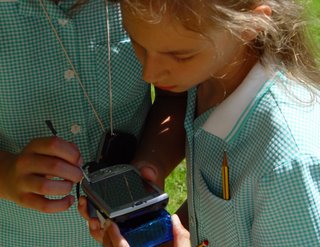Halloran, J., Hornecker, E., Fitzpatrick, G., Weal, M., Millard, D., Michaelides, D., Cruickshank, D., & Roure, D. D. (2006). The Literacy Fieldtrip: Using ubicomp to support children’s creative writing. Proceeding of the 2006 conference on Interaction design and children IDC '06, (ACM Press) (pp.17-24), Tampere, Finland.
ABSTRACT
Recently, ubiquitous computing (UbiComp) has been used to enhance fieldtrips in theseeducational areas by augmenting environments with a rangeof instruments, devices and sensors. However, the sorts ofinteraction design that UbiComp makes possible have thepotential not just to enhance the value of educationaltechniques in known application areas, but also to expandthe application of those techniques into new areas ofcurriculum. This paper report on a UbiComp-supported fieldtrip tosupport creative writing, associated with the learning ofliteracy skills. It discusses how the fieldtrip, designed andrun in the grounds of a historic English country house , engendered interactions whichchanged both the processes and products of creativewriting, with benefits for both teachers and children.
People: Year 5 UK schoolchildren at Whiteley School, Hampshire, UK. ; staff fromChawton House; and two senior teachers from Whiteley Primary School: the head teacher, Pam, and the deputyhead, Leila.
Place: Chawton House, also in Hampshire, owned by the Knight family from the 16th Century, is associated with the well-known English writer JaneAusten.
這篇是報告在無線運算的戶外教學環境中,來幫助寫作和相關的素養技能(literacy skills)。討論如何在一個有歷史背景的環境中設計教學活動,來產生出互動以及創造寫作。
學生發現目前的行動學習已朝向戶外發展的趨勢,較早所讀的paper中,大多都是探討在教室內如何將學習軟體與行動載具結合,應用在自然科學教學和學習方面。當然,行動載具的行動性是非常適合用來與環境和情境的互動,本來就該探討戶外的活動。這篇報告的所使用的教學理論基礎為素養技能,學習者不但能夠在環境中進行探索,最後利用探索的記錄寫成故事。研究中所使用的是混合工具:數位(PDA)和類比(筆記本和筆)工具,在寫作時,學習者意識到筆記本比PDA來的實用多了。的確,我們期待科技工具帶來的是輔助效果,而不是取代傳統教學。




